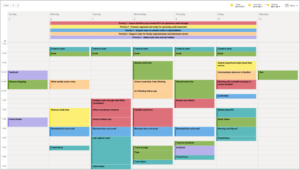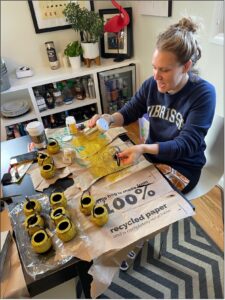It’s time for another Togetherness Talk. Last time you met a district superintendent. This time I’ve got another person from the Charlotte-Mecklenburg school system I’ve long admired – first as a principal and now in her current role as a first-year doctoral candidate at Harvard. I prioritized speaking with Alison because I was interested in seeing how her strong Togetherness practices were holding up in a radically different context
Alison says it like it is:
“Time is a resource that I continue to see people leverage ineffectively. I constantly wonder how much we can tinker with this to help make them more effective in their roles as leaders – which can have a major impact on an organization.”
Awesome. With that in mind, let’s dig into Alison’s approach.
Maia: How do you spend your days now that you have shifted to life as a graduate student?
Alison: I spend about 50% of my day in classes. My remaining waking hours are spent reading, reading, reading, writing, researching, and practicing some element of self-care.
Maia: What is the first thing you do when you arrive on campus each morning?
Alison: My first class typically starts around 8:30 AM, so I’m always on campus by 8:00 AM. I’ve blocked a daily Meeting with Myself in a quiet spot. I review my schedule for the day and ensure that I’ve filled the white space with productive tasks. Maximizing bits of time between classes is critical to ensuring I’m not leaving everything to be completed at home in the evening.
Maia: How have you had to adjust systems in the transition from principalship to grad school?
Alison: One of the major differences is predictability. As a principal, I had to leave flexible time in my schedule to be available to students, families, teachers, and emergencies. Now as a full-time student, 98% of what happens is totally predictable. I know when my classes are held and my syllabi outline all of my assignments. As a result, I’ve engaged in a lot more “mini-goal” planning to make sure I am working on assignments well in advance.
I’ve also been a lot more intentional about incorporating self-care into my schedule as a student. I wish I would have learned this lesson earlier, but given the predictability, I no longer have an excuse to not go to the gym or talk a walk. If I don’t take care of myself, I know it’s because I did not use my time wisely.
Maia: What do you do when something throws off your plan? How do you regroup?
Alison: There is a great deal of group work in my program, which means we often have to find common time for many people to come together. This always takes some time, but when it happens, I’m able to adjust quickly. For example, just last week I was assigned a group project with a team of four other people. Although I had not planned on adding a group meeting into my schedule (I plan a week out in advance), I was able to easily move my “work time” around to accommodate a group meeting without worrying I would overbook myself or miss a deadline.

Alison’s Weekly Calendar, click to enlarge
Having everything on my calendar gives me a clear sense of the trade-offs and changes I need to make at any moment, which allows me to negotiate with myself on my time and stand firm on the events that can’t be changed.
Maia: How do you set expectations and model Togetherness?
Alison: One of the first things I do is to let folks know that I am a J on the Myers-Briggs personality indicator. I love schedules and structures. I am then able to model that for others by being respectful of the time commitments they have made. When trying to align schedules for a group project, my first question is not about when is everyone available; instead I ask, “What days and times are off the table?” This tends to show people that whatever they have planned (and what I have planned) is important enough that we should not compromise too quickly.
Maia: What’s one Togetherness Battle you no longer fight?
Alison: My transition to grad school has given me an opportunity to really prioritize my “big rocks.” 8 hours of sleep is very important to me and I like to get up early in the morning, so I actually put my bedtime on my calendar. Then I fill in my schedule with other self-care elements like church, workouts, meal prep, and down time. Before, I would start with all the work stuff I had and try to squeeze in self-care everywhere else. Now that I’m clear about my priority to keep healthy and whole, my calendar reflects that.
Maia: What is your favorite organization tool or strategy and why?
Alison: That has to be my Meeting with Myself! Every Thursday evening, I sit down and look back at the week to see what was accomplished and what didn’t get done. I also look at what’s ahead. I do this on Thursdays because it’s my last day of classes for the week. By then, my brain is a bit fried, but I’m energized by seeing how I can maximize my time for the next week to support me in taking care of myself and performing well as a student!


